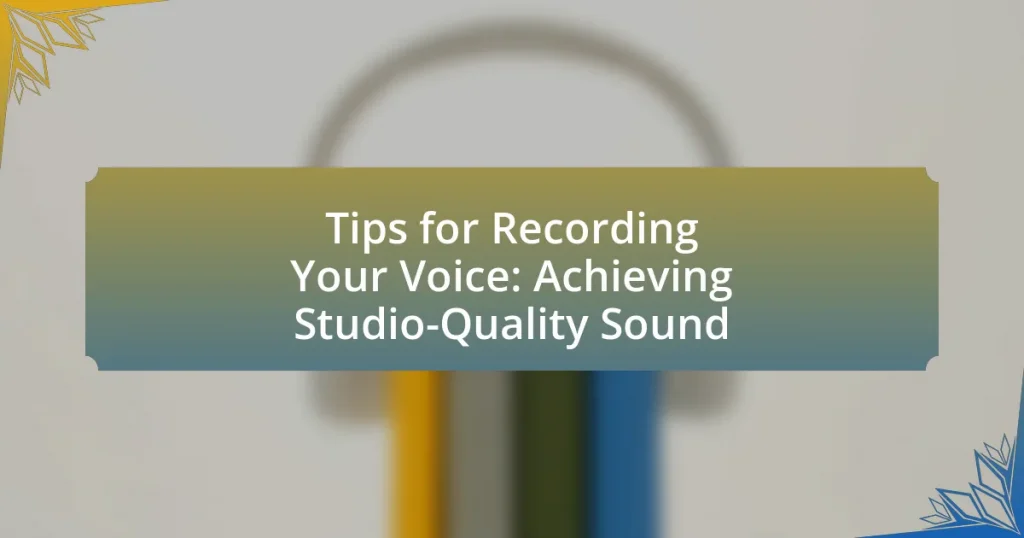A compelling bio for a singer portfolio is a crucial narrative that encapsulates the artist’s musical journey, achievements, and distinctive style. It should include essential elements such as musical influences, notable performances, and awards, while also engaging potential fans and industry professionals. The article outlines the importance of a well-crafted bio in enhancing credibility, attracting opportunities, and fostering audience engagement. It provides guidance on key components to include, effective writing styles, common pitfalls to avoid, and best practices for tailoring bios across different platforms, ensuring that singers can effectively communicate their identity and artistic vision.

What is a Compelling Bio for Your Singer Portfolio?
A compelling bio for your singer portfolio is a concise narrative that highlights your musical journey, achievements, and unique style. This bio should include key elements such as your musical influences, notable performances, and any awards or recognitions you have received. For instance, mentioning specific venues where you have performed or collaborations with other artists can enhance credibility. Additionally, incorporating personal anecdotes or insights into your artistic process can create a connection with your audience. A well-crafted bio not only informs but also engages potential fans and industry professionals, making it an essential component of your portfolio.
Why is a Bio Important for Singers?
A bio is important for singers because it serves as a concise introduction that highlights their musical background, achievements, and unique style. This information helps potential fans, industry professionals, and collaborators understand the singer’s identity and artistic vision. A well-crafted bio can enhance a singer’s credibility and marketability, as it often includes notable performances, awards, and influences that establish their presence in the music industry. For instance, a study by the Music Industry Research Association indicates that artists with professional bios are more likely to attract attention from booking agents and record labels, demonstrating the bio’s role in career advancement.
How does a Bio impact a singer’s career?
A bio significantly impacts a singer’s career by serving as a critical marketing tool that shapes public perception and attracts opportunities. A well-crafted bio highlights a singer’s unique qualities, achievements, and musical style, making it easier for industry professionals, such as agents and promoters, to understand their brand. For instance, a bio that includes notable performances, awards, or collaborations can enhance credibility and appeal, leading to increased bookings and media attention. According to a survey by Sonicbids, 70% of music industry professionals consider an artist’s bio essential when deciding whether to listen to their music or book them for events. This statistic underscores the importance of a compelling bio in establishing a singer’s presence in a competitive market.
What role does a Bio play in audience engagement?
A bio plays a crucial role in audience engagement by providing a concise summary of an artist’s identity, achievements, and unique qualities. This summary helps potential fans connect emotionally with the artist, fostering a sense of familiarity and trust. Research indicates that personal storytelling in bios can increase audience interest and loyalty, as it allows fans to relate to the artist’s journey and experiences. For example, a well-crafted bio that highlights significant milestones and personal anecdotes can lead to higher engagement rates on social media platforms, as audiences are more likely to share and interact with content that resonates with them personally.
What Elements Should be Included in a Singer’s Bio?
A singer’s bio should include essential elements such as the artist’s name, musical genre, notable achievements, performance history, and personal background. The artist’s name establishes their identity, while the musical genre provides context for their style. Notable achievements, such as awards or chart rankings, highlight their credibility and success in the industry. Performance history, including venues and collaborations, showcases their experience and reach. Personal background, including influences and motivations, adds depth and relatability to the bio. These elements collectively create a comprehensive and engaging portrayal of the singer, making it easier for audiences and industry professionals to connect with them.
What personal information is essential?
Essential personal information for a singer’s bio includes the singer’s name, musical genre, notable achievements, performance experience, and contact information. This information provides a clear identity and context for the singer, allowing potential collaborators and audiences to understand their background and expertise. For instance, including specific awards or performances at significant venues can enhance credibility and attract interest.
How can musical achievements enhance the Bio?
Musical achievements can enhance a bio by showcasing credibility and expertise in the music industry. Specific accomplishments, such as awards, notable performances, or collaborations with recognized artists, provide tangible evidence of a singer’s talent and dedication. For instance, winning a prestigious music award like a Grammy or performing at major festivals can significantly elevate a singer’s profile, making them more appealing to potential fans, collaborators, and industry professionals. These achievements serve as a testament to the singer’s skills and commitment, thereby strengthening their overall narrative in the bio.
How Can You Make Your Bio Stand Out?
To make your bio stand out, focus on showcasing your unique experiences and achievements in the music industry. Highlight specific milestones, such as notable performances, collaborations, or awards, which can differentiate you from other artists. For instance, mentioning that you performed at a major festival or collaborated with a well-known musician adds credibility and interest. Additionally, using a compelling narrative style can engage readers, allowing them to connect with your personal journey and artistic vision. This approach not only captures attention but also establishes a memorable identity in a competitive field.
What writing style is most effective for a singer’s Bio?
The most effective writing style for a singer’s bio is a conversational and engaging tone that reflects the singer’s personality and artistry. This style allows the audience to connect with the singer on a personal level, making the bio relatable and memorable. For instance, using first-person narrative can create intimacy, while incorporating anecdotes or unique experiences can highlight the singer’s journey and passion for music. This approach is supported by the fact that bios that resonate emotionally tend to engage readers more effectively, as evidenced by numerous successful artist bios that prioritize storytelling and authenticity.
How can storytelling be incorporated into your Bio?
Storytelling can be incorporated into your bio by weaving personal anecdotes and experiences that highlight your journey as a singer. This approach engages readers by providing context about your motivations, challenges, and milestones, making your bio relatable and memorable. For instance, sharing a pivotal moment that inspired you to pursue music can create an emotional connection with your audience, enhancing their understanding of your artistic identity. Research indicates that narratives can significantly increase engagement and retention of information, as evidenced by studies showing that stories are 22 times more memorable than facts alone.
What Common Mistakes Should You Avoid in Your Bio?
Common mistakes to avoid in your bio include being overly vague, using jargon, and neglecting to highlight your unique qualities. Vague descriptions fail to convey your identity and achievements, making it difficult for readers to connect with you. Using jargon can alienate potential fans or industry professionals who may not understand the terminology. Additionally, neglecting to emphasize what makes you unique can result in a bio that blends in with others, failing to capture attention. These mistakes can diminish the effectiveness of your bio in showcasing your artistry and attracting the right audience.
How can you ensure your Bio is concise and relevant?
To ensure your Bio is concise and relevant, focus on key achievements and experiences that directly relate to your singing career. Start by identifying the most significant aspects of your musical journey, such as notable performances, awards, or collaborations, and summarize them in clear, straightforward language. Research indicates that bios should ideally be between 100 to 200 words to maintain reader engagement while providing essential information. By prioritizing relevant details and avoiding unnecessary embellishments, you create a focused narrative that resonates with your audience.
What clichés should be avoided in a singer’s Bio?
Clichés that should be avoided in a singer’s bio include phrases like “I’ve been singing since I was a child,” “music is my life,” and “I want to change the world with my music.” These expressions lack originality and fail to convey unique aspects of the singer’s journey or artistry. Instead, a compelling bio should focus on specific experiences, achievements, and influences that define the singer’s identity. For instance, mentioning particular genres, notable performances, or collaborations provides a clearer picture of the artist’s style and impact, making the bio more engaging and memorable.
How Do You Tailor Your Bio for Different Platforms?
To tailor your bio for different platforms, focus on the specific audience and purpose of each platform. For example, on social media like Instagram, use a casual tone and highlight your personality and recent projects, while on LinkedIn, maintain a professional tone and emphasize your experience and achievements in the music industry. Research shows that bios tailored to the platform’s audience increase engagement; for instance, a study by Sprout Social found that 70% of consumers feel more connected to brands with relatable content.
What adjustments should be made for social media?
To enhance social media presence for a singer portfolio, adjustments should include optimizing profiles with relevant keywords, engaging visuals, and consistent branding. Profiles should feature a clear bio that highlights musical style and achievements, using keywords that potential fans or industry professionals might search for. Engaging visuals, such as high-quality images or videos, can attract attention and showcase talent effectively. Consistent branding across platforms, including logos and color schemes, reinforces identity and makes the portfolio easily recognizable. These adjustments are supported by studies indicating that optimized profiles can increase visibility and engagement on social media platforms, leading to a broader audience reach.
How can you modify your Bio for press kits?
To modify your bio for press kits, focus on tailoring the content to highlight your achievements, relevant experiences, and unique qualities that resonate with the media and target audience. This involves emphasizing key milestones in your music career, such as notable performances, awards, and collaborations, while maintaining a concise and engaging narrative. For instance, including specific statistics like the number of albums sold or audience reach can enhance credibility and interest. Additionally, ensure that the tone aligns with the branding of your music and the expectations of the press, making it easy for journalists to extract essential information for their stories.
What Are the Best Practices for Writing a Singer’s Bio?
The best practices for writing a singer’s bio include being concise, highlighting key achievements, and showcasing personality. A concise bio typically ranges from 150 to 300 words, ensuring that it captures attention quickly. Key achievements should include notable performances, awards, or collaborations that establish credibility and expertise in the music industry. Showcasing personality involves using a tone that reflects the singer’s style and character, making the bio relatable and engaging for the audience. Additionally, incorporating specific details, such as the singer’s musical influences or unique experiences, can enhance the narrative and create a memorable impression.
How often should you update your Bio?
You should update your bio at least once a year or whenever significant changes occur in your career. Regular updates ensure that your bio reflects your most current achievements, experiences, and skills, which is crucial for maintaining relevance in the competitive music industry. For instance, if you release new music, collaborate with other artists, or receive awards, these milestones should be included promptly to keep your audience informed and engaged.
What tips can help you write a compelling Bio effectively?
To write a compelling bio effectively, focus on clarity, authenticity, and engagement. Start with a strong opening that captures attention, such as a unique fact or a personal story that relates to your music journey. Use concise language to highlight your achievements, influences, and style, ensuring that the tone reflects your personality. Incorporate specific details, such as notable performances or collaborations, to establish credibility and connect with your audience. Additionally, consider your target audience and tailor the content to resonate with them, making it relatable and memorable.















